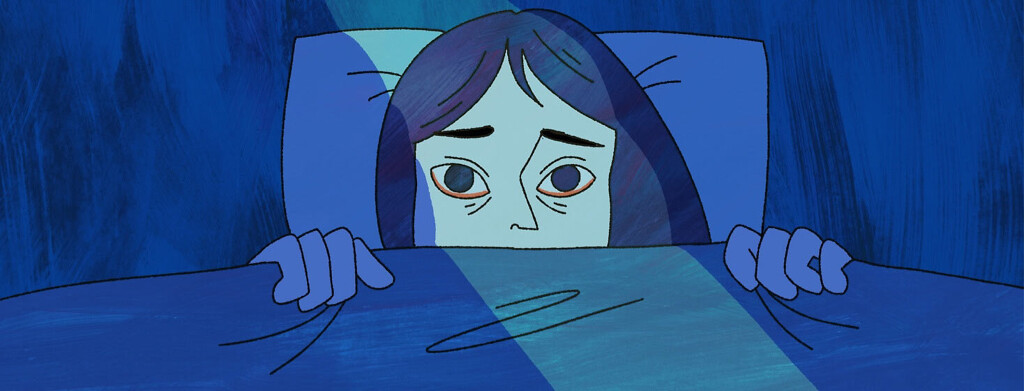Why Does Cancer Cause Insomnia?
This article was originally published on BladderCancer.net by TK Sellman.
Published research confirms that insomnia affects between half and three-quarters of all people who have been diagnosed with cancer. Other research suggests that 25 percent of cancer survivors continue to suffer from sleep problems.
Cancer can rob you of the sleep you need to heal
This is problematic for 1 chief reason: sleep is your body’s best opportunity for healing. The immune system needs the support of good sleep to function. Without sleep, cancer can worsen. Poor sleep also makes living with cancer harder because of daytime fatigue, increased pain sensitivity, and mood disruption.
Time to take a closer look at insomnia and how it can affect people living with cancer.
What is insomnia?
Insomnia describes problems with sleeplessness. You may have trouble falling asleep or trouble staying asleep. You may also wake up far too early and not be able to fall back asleep.
Acute insomnia
This describes sleeplessness that only happens once in a while but is very disruptive to sleep-wake patterns. Acute insomnia leads to daytime sleepiness. It can occur following a new diagnosis or after a period of therapy.
Chronic insomnia
This describes regular patterns of sleeplessness that occur over a period of at least 4 weeks. Many people with cancer suffer from long-lasting periods of insomnia.
Why do people with cancer have insomnia?
Predisposition
If you had bouts of insomnia or a circadian rhythm disorder prior to your cancer diagnosis, these can become magnified when you are ill. They may even get worse following successful treatment. Also, women and seniors tend to have more sleep problems, even when they do not have cancer.
Anxiety
Living with cancer naturally creates anxiety. Racing thoughts about your future, uncertainty about treatments, being overwhelmed by too much complex information and fearing potential relapses if you are a survivor all contribute to bedtime anxiety.
Therapy
Treatments can contribute to sleep problems. Radiation and chemotherapy can create circadian disruptions. This is also true of visits to the hospital (not a great place to sleep!). The pain that cancer brings also makes sleep harder. Pain is sleep's public enemy number 1.
Daytime naps
Sometimes you just need to sleep during the day. But that nap might make it harder for you to fall asleep at bedtime.
Medicine
Whether they are prescribed for cancer, pain, or other conditions (related or not), many drugs can mess with your sleep.
Physical changes
Cancer and can lead to things like anemia, hot flashes, and inflammation. These can cause daytime fatigue, which makes you need to nap, which leads to problems falling asleep or staying asleep. It is a vicious cycle.
If you have cancer and you cannot sleep
If you suffer from sleeplessness, it is important to fight back. Poor sleep in people with cancer can lead to:
- Drowsy driving
- Poor cognitive function
- Lower quality of life
- Depression
- Poor treatment compliance
- Reduced survival rate
You can take these steps to seek the relief you need so you can achieve better sleep at night and enjoy more alertness and less fatigue during the day.
Mention your sleep problems to your oncologist
They should have tools and strategies in place for helping you cope with insomnia. If your doctor does not ask you about sleep, bring it up anyway. If you are looking at post-treatment insomnia, you should still bring it up.
Mention daytime sleepiness, too
If you have daytime sleepiness, mention this to your doctor, too. Daytime fatigue has many causes, with cancer and cancer therapies only being 2. You will want to identify the root causes of both your insomnia and daytime fatigue.
Approaches that do not use drugs
Be prepared to start a practice in CBT-i. If you are lucky, your cancer treatment facility will offer cognitive behavioral therapy (CBT), or a specialized form for insomnia (CBT-i). These approaches can help you reclaim sleep at night and energy during the day without taking any drugs.
Medicine
There are drug therapies that can be useful for getting sleep, but they come with risks. Melatonin can be a useful supplement with far fewer safety issues. The timing and dosage of these medicines are critical. Do not go this route without the supervision of your oncologist. You might disrupt your circadian system and make things worse.
Exercise
Regular exercise (ideally in the morning) can help you maintain strong circadian rhythms that promote sleep.
Alternatives
Alternatives like yoga stretch, yogic breathing, and meditation can help you relax so you can fall asleep.
Find ways to prioritize sleep
This means asking others to respect your need for sleep at any time of day. It also means finding or creating comfortable, dark, quiet sleeping spaces and having good sleep hygiene. For instance, do not take phones, tablets, or laptops to bed. Their blue spectrum light can make your body stop making melatonin. Also, avoid caffeine after lunch, and skip the evening adult beverages. These contribute to poor sleep and make you wake up more at night.

Join the conversation